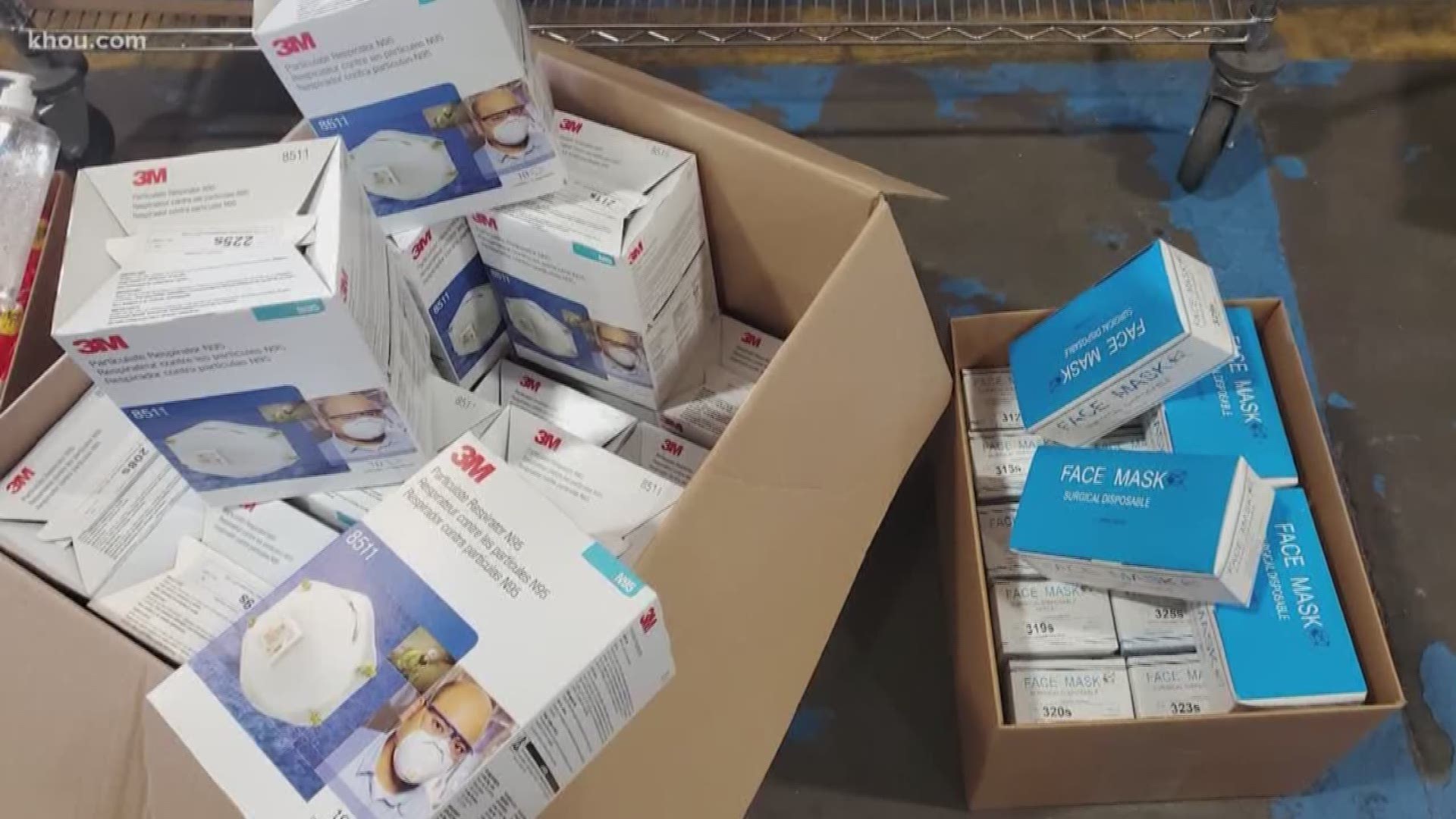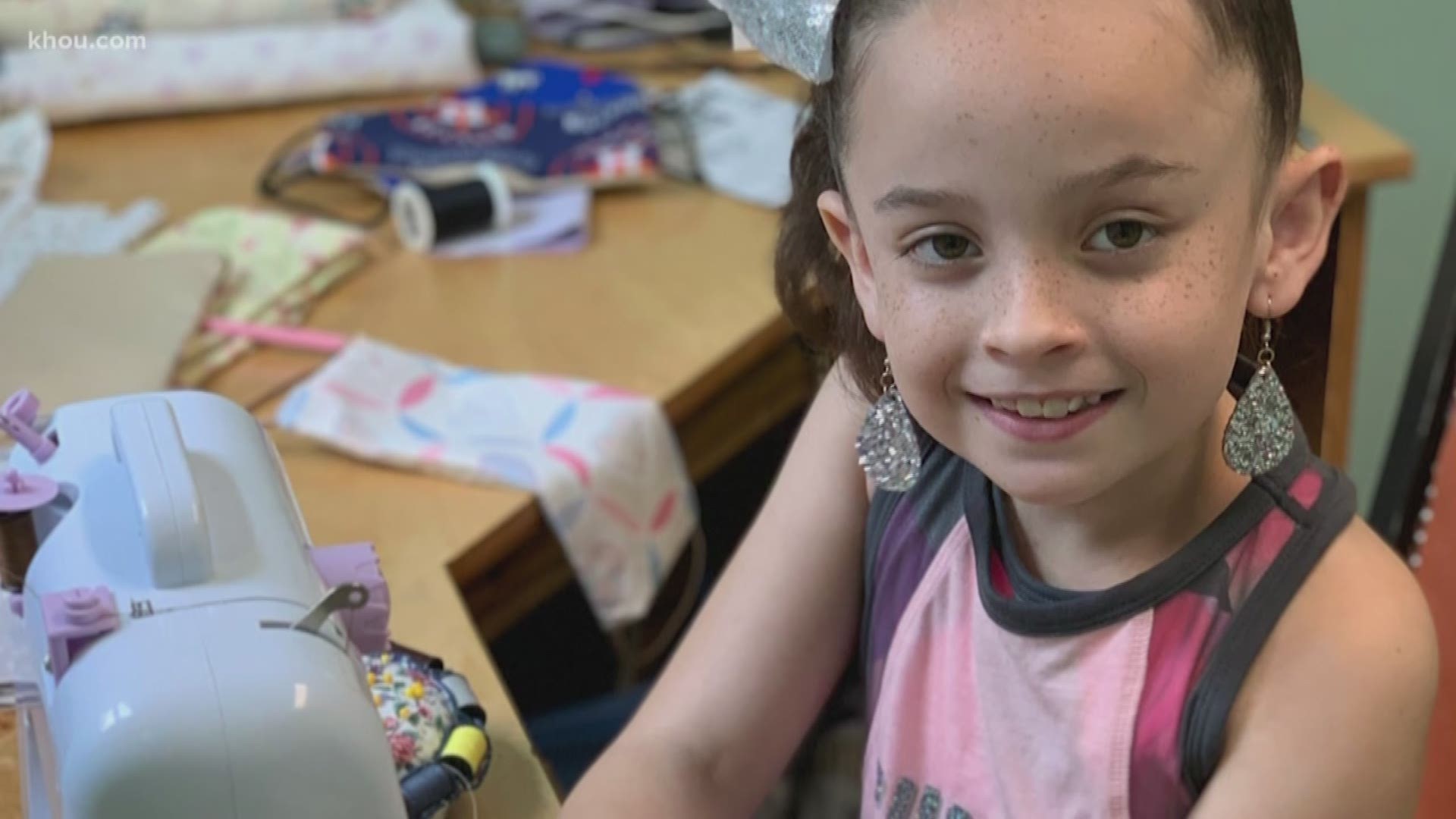HOUSTON — As Texas Medical Center hospital workers and first responders are dealing with a critical shortage of personal protective equipment, there are 750,000 medical-grade masks sitting in a Houston warehouse in limbo.
The masks were up for auction until Tuesday when a stop was placed on their distribution due to allegations of price gouging by the Texas Attorney General’s Office.
The auctioneer said he is now caught in the middle and wants someone to tell him what he is supposed to do with nearly a million masks.
“The people that need them, we’ve got to get it to them,” auctioneer Tim Worstell, of Houston’s Auctions Unlimited, said. “To me, that’s 99% of the buyers in this sale.”
Worstell said he and his family have received death threats since he was consigned to perform the auction of the surgical and N-95 masks and sanitation products.
He said the handful of sellers who contracted him are reputable businesses but they do not want to be identified publicly. Worstell said he has done business with them before and has even auctioned lots of surgical masks for them in the past.
This auction was different.
“If I’d have seen it coming I definitely wouldn’t have done it,” Worstell said. “This is a small percentage of my business, and it has not been worth it, to say the least.”
The final prices of the lots were varied but all of them sold above retail value.
Worstell said his commission for the sales would have amounted to close to $40,000, but in retrospect, he still would not have done it.
He isn't able to collect a dime from the buyers for the sellers, and the masks can't be given to the winning bidders or anyone else who needs them for that matter.
KHOU spoke with several of the auction winners Wednesday who asked to remain anonymous.
Each of them said they bought the masks to give away to local hospital workers, nursing homes, first responders and at-risk family members.
They aren't happy.
“Now, the problem is all of these people who desperately need them ... They (the masks) could have been on these peoples’ faces already, protecting them, and they are just now sitting in our warehouse,” Auctions Unlimited office manager Shannon Stone said.
Worstell received a demand letter from Texas Attorney General Ken Paxton’s Office on March 20, instructing him to discontinue all sales of the masks.
The letter accuses Worstell of price gouging during an emergency.
Worstell said he has been calling the investigator to find out what he is supposed to do with all of the masks now that the auction is closed.
He said nobody will call him back.
“We’re just waiting on the attorney general’s office,” Worstell said. “Can we let these facemasks go to the people who desperately need them, or can we not?”
KHOU called the Texas Attorney General’s Office on Wednesday to find out what the auctioneer should do with the critical PPE now in his possession.
The AG's Office could not confirm or deny any ongoing investigations, a spokeswoman stated in an emailed response, which states the office has received a total of nearly 2,200 COVID-19-related price gouging complaints.
Worstell said he’s cooperated with the Houston Police Department which came to his business to create a report and take photographs.
Without answers, Worstell is sitting and waiting with 750,000 medical masks.
Coronavirus symptoms
The symptoms of coronavirus can be similar to the flu or a bad cold. Symptoms include a fever, cough and shortness of breath, according to the Centers for Disease Control. Some patients also have nausea, body aches, headaches and stomach issues. Losing your sense of taste and/or smell can also be an early warning sign.
Most healthy people will have mild symptoms. A study of more than 72,000 patients by the Centers for Disease Control in China showed 80 percent of the cases there were mild.
But infections can cause pneumonia, severe acute respiratory syndrome, kidney failure and even death, according to the World Health Organization. Older people with underlying health conditions are most at risk for becoming seriously ill. However, U.S. experts are seeing a significant number of younger people being hospitalized, including some in ICU.
The CDC believes symptoms may appear anywhere from two to 14 days after being exposed.
Human coronaviruses are usually spread through...
- The air by coughing or sneezing
- Close personal contact, such as touching or shaking hands
- Touching an object or surface with the virus on it, then touching your mouth, nose or eyes before washing your hands.
Help stop the spread of coronavirus
- Stay home when you are sick.
- Eat and sleep separately from your family members
- Use different utensils and dishes
- Cover your cough or sneeze with your arm, not your hand.
- If you use a tissue, throw it in the trash.
- Follow social distancing
Lower your risk
- Wash your hands often with soap and water for at least 20 seconds. If soap and water are not available, use an alcohol-based hand sanitizer.
- Avoid touching your eyes, nose, and mouth with unwashed hands.
- Avoid close contact with people who are sick.
- Clean and disinfect frequently touched objects and surfaces.
- If you are 60 or over and have an underlying health condition such as cardiovascular disease, diabetes or respiratory illnesses like asthma or COPD, the World Health Organization advises you to try to avoid crowds or places where you might interact with people who are sick.
Get complete coverage of the coronavirus by texting 'FACTS' to 713-526-1111.


